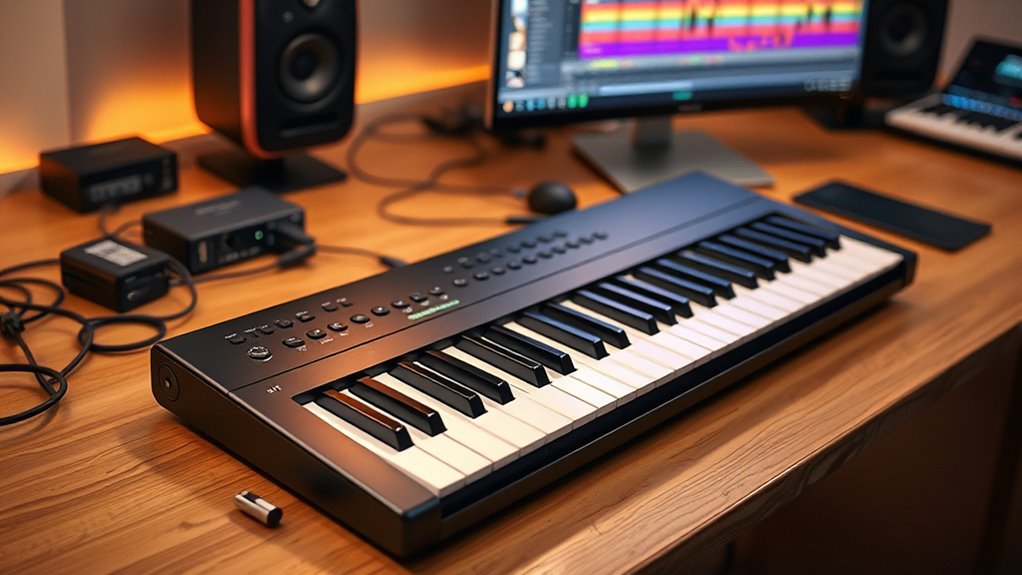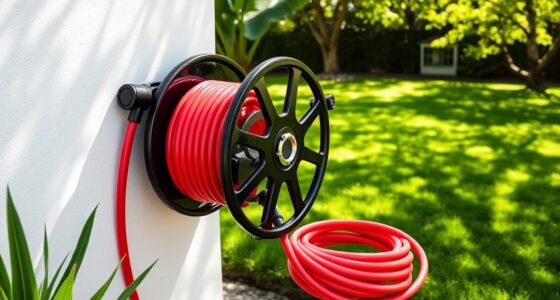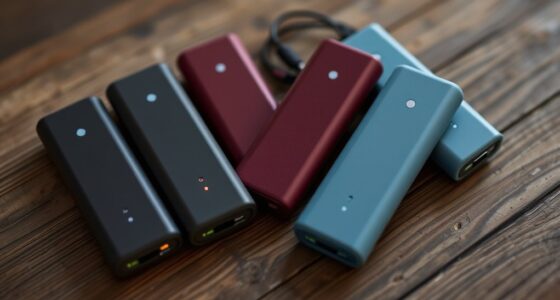If you’re starting out, I recommend options like the M-VAVE 25 Key USB MIDI Controller, Akai MPK Mini MK3, and Donner N-25 for their portability, good features, and ease of use. For more advanced needs, models like the Alesis Melody 61 MK4 or the RockJam 61-Key Touch Display offer extra versatility. Keep in mind connectivity and software support. Want to find the perfect fit? Keep following for detailed insights on each!
Key Takeaways
- Compact 25-key controllers like Akai MPK Mini MK3 and Donner N-25 are ideal for beginners with limited space and portability needs.
- Full-size 88-key digital pianos offer authentic feel and advanced features for serious beginners developing their technique.
- Many models support plug-and-play USB-MIDI connectivity with compatible DAWs and include bundled software for easy setup.
- Features like built-in sounds, educational modes, and assignable controls enhance learning and creative exploration.
- Lightweight, battery-powered options with added accessories make these MIDI keyboards perfect for practice on the go.
M-VAVE 25 Key USB MIDI Keyboard Controller with Drum Pads and Bluetooth

If you’re just starting out with music production, the M-VAVE 25 Key USB MIDI Keyboard Controller is an excellent choice because it combines portability with user-friendly features. Its compact design makes it easy to carry, while the semi-weighted keys deliver expressive play. The 8 backlit drum pads and assignable knobs give you hands-on control, and the Bluetooth connectivity lets you jam wirelessly. Plus, it works seamlessly with Windows, Mac, iOS, and Android devices. Whether you’re practicing, recording, or performing, this controller offers versatile features like smart chord functions and software included, making your music creation process smooth and enjoyable.
Best For: beginner and intermediate music producers seeking a portable, easy-to-use MIDI controller with versatile features for practice, recording, and live performance.
Pros:
- Compact and lightweight design for easy portability and setup
- Semi-weighted keys for expressive playing experience
- Wireless Bluetooth connectivity for cable-free operation
Cons:
- Limited to 25 keys, which may not suit advanced keyboard players needing more range
- Built-in battery life may vary depending on usage, potentially requiring frequent charging
- Lacks extensive control options compared to larger MIDI controllers
Akai MPK Mini MK3 USB MIDI Keyboard Controller
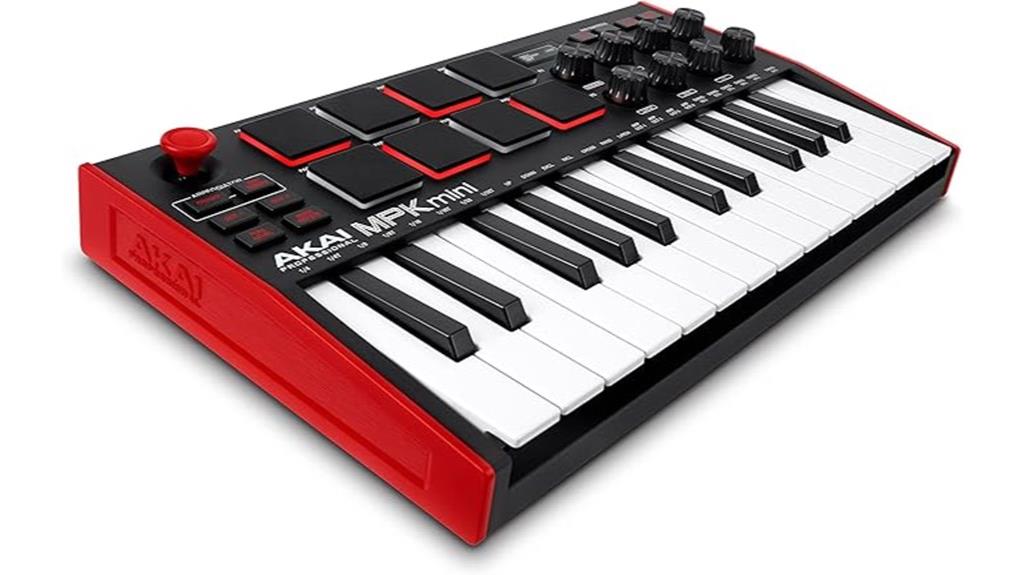
The Akai MPK Mini MK3 USB MIDI Keyboard Controller is an excellent choice for beginners because of its compact design and user-friendly features. Its 25 velocity-sensitive mini keys make playing expressive melodies easy, while the 8 backlit MPC-style drum pads are perfect for beat making. The 8 assignable knobs give quick control over mixing and effects, and the 4-way thumbstick adds dynamic pitch and modulation control. With built-in arpeggiator and seamless DAW integration, it’s versatile for studio and travel use. Plus, the included software and sound content make it simple to start creating right away. It’s truly an all-in-one portable solution for aspiring musicians.
Best For: beginners and aspiring musicians seeking a portable, easy-to-use MIDI controller with comprehensive features for music production and beat making.
Pros:
- Compact and lightweight design ideal for portability and on-the-go use
- User-friendly interface with intuitive controls and seamless DAW integration
- Includes extensive sound libraries and software for immediate music creation
Cons:
- Limited keys (25) may restrict complex or expansive performances
- Plastic build might feel less durable compared to metal-bodied controllers
- Advanced users might find the feature set somewhat basic for professional studio use
Alesis Melody 61 MK4 Keyboard Piano for Beginners
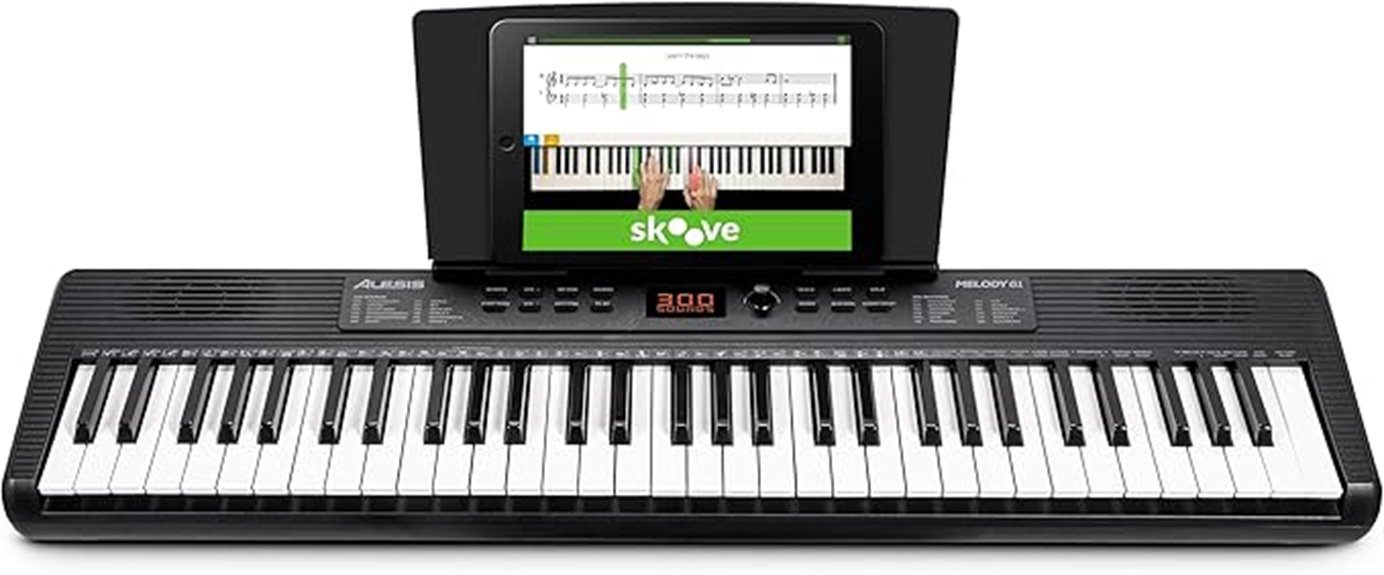
For beginners seeking an affordable, portable keyboard that helps build foundational skills, the Alesis Melody 61 MK4 stands out as an excellent choice. Its 61 compact keys and lightweight design (just 6.6 pounds) make it easy to carry and practice anywhere. It offers 300 built-in sounds across various instruments, plus layering and splitting capabilities for creative exploration. The included features like a full-back sheet music stand, built-in speakers, and multiple connectivity options—USB-MIDI, headphone, and sustain pedal input—enhance the learning experience. With bundled online lessons and demo songs, it provides a extensive, user-friendly platform to develop your musical skills from the ground up.
Best For: beginners and students seeking an affordable, portable keyboard with built-in learning tools to develop foundational piano skills.
Pros:
- Lightweight and portable design for easy transport and practice anywhere
- Extensive 300 sound options with layering and splitting capabilities for creative flexibility
- Bundled with online lessons and demo songs, providing structured learning support
Cons:
- Limited to 61 keys, which may not suit advanced pianists requiring full-range keyboards
- Batteries are not included, requiring additional purchase for portable use
- Basic features may lack advanced functions desired by more experienced players
MUSTAR 61-Key Learning Piano Keyboard (MEKS-500)
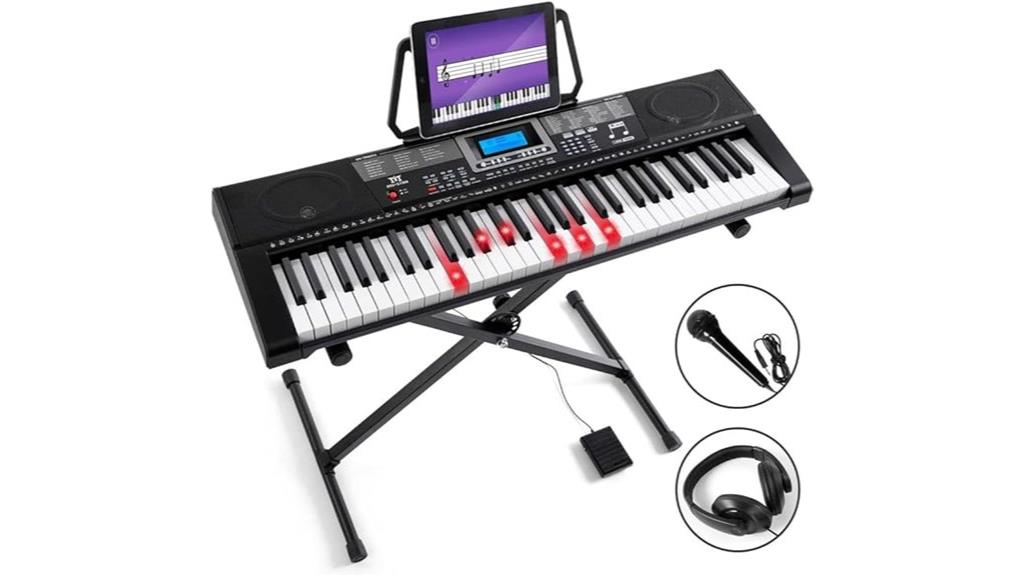
Looking for a beginner-friendly keyboard that makes learning both fun and accessible? The MUSTAR 61-Key Learning Piano (MEKS-500) is a fantastic choice. It features lighted, full-size keys suitable for all ages, along with a compact, stylish design. You can play anywhere using batteries or a power cord, and it comes with a range of built-in features like demo songs, multiple tones, rhythms, and educational modes. The included stand, music rest, headphones, and USB connectivity make it a thorough, easy-to-use setup. With its realistic sound and interactive learning modes, the MUSTAR MEKS-500 is perfect for beginners eager to discover their musical potential.
Best For: beginners of all ages seeking an interactive, portable, and feature-rich keyboard to start their musical journey with ease.
Pros:
- Lighted, full-size keys facilitate easy learning and are suitable for children, teens, and adults
- Built-in educational modes and app compatibility enhance interactive learning experiences
- Portable design with battery and cord options allows for practice anywhere, indoors or outdoors
Cons:
- Slightly limited polyphony and advanced features for professional or experienced players
- May require additional accessories like a stand or additional software for full functionality
- Some users might find the sound quality less sophisticated compared to higher-end digital pianos
Donner Mini MIDI Keyboard (N-25)
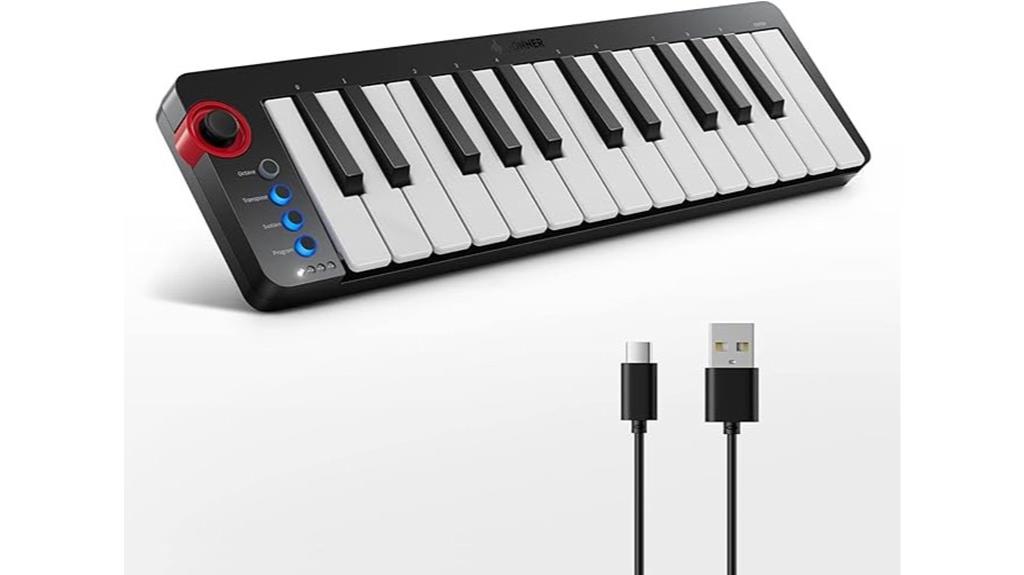
If you’re new to music production, the Donner Mini MIDI Keyboard (N-25) stands out as an excellent choice thanks to its compact design and user-friendly features. Its 25 velocity-sensitive mini keys are perfect for creating melodies and riffs on the go. The keyboard measures just 3.86 x 13.39 x 1.29 inches and weighs only 1.26 pounds, making it highly portable. It includes a pitch-bend wheel, light-up buttons for visual feedback, and four user-programmable banks. Compatible with Mac, iOS, PC, iPhone, and iPad via USB-MIDI, it works seamlessly with popular DAWs, making it ideal for beginners seeking easy, versatile music production.
Best For: beginners and on-the-go musicians seeking an easy-to-use, portable MIDI controller for melody creation and music production.
Pros:
- Compact, lightweight design ideal for portability and travel
- Velocity-sensitive mini keys for expressive playing
- Compatible with a wide range of DAWs and devices via plug-and-play USB-MIDI
Cons:
- Limited to 25 keys, which may restrict complex compositions
- Lacks additional control features like knobs or transport controls
- May require external software or hardware for advanced production capabilities
Alesis 88-Key Keyboard Piano with Accessories
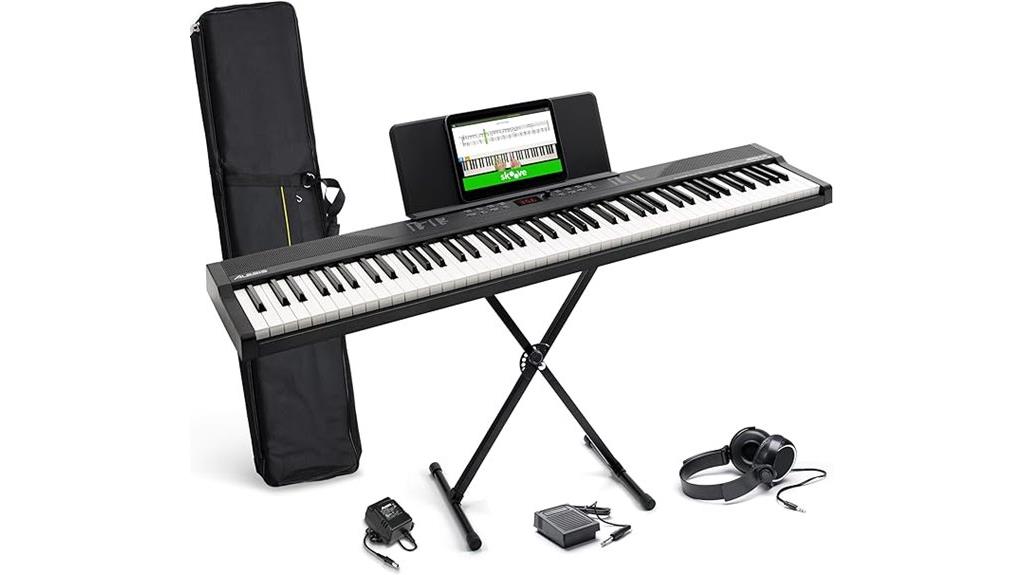
The Alesis 88-Key Keyboard Piano with Accessories stands out as an ideal choice for beginners who want an authentic piano experience without sacrificing portability. It features full-size, touch-sensitive keys that mimic acoustic pianos, making it perfect for developing finger strength and dexterity. The built-in speakers deliver rich, realistic sound, enhancing your practice sessions. With 480 sounds, adjustable reverb, and 160 rhythms, it’s versatile for various genres. The bundle includes essential accessories like a stand, sustain pedal, headphones, and a carry case, plus connectivity options for recording and lessons. It’s lightweight, easy to use, and adaptable, making it an excellent starter instrument.
Best For: Beginners seeking an authentic, portable piano experience with versatile features and comprehensive accessories to support learning and performance.
Pros:
- Full-size, touch-sensitive keys that simulate acoustic piano sound, ideal for developing finger strength and dexterity
- Includes a wide variety of sounds, rhythms, and demo songs for versatile musical exploration
- Comes with essential accessories such as a stand, sustain pedal, headphones, and carry case for convenience and portability
Cons:
- Power options require either an adapter or 6 AA batteries (not included), which may be less convenient for some users
- The bundle, while comprehensive, might be more than needed for purely casual or minimalistic players
- As a beginner-focused instrument, advanced players may find the sound library and features somewhat limited for professional use
Nektar Impact GX61 USB MIDI Controller Keyboard

The Nektar Impact GX61 USB MIDI Controller Keyboard is an excellent choice for beginners who want a versatile and user-friendly setup. It features 61 synth-action keys, along with on-board pitch bend and modulation wheels, making expressive playing easy. With 14 MIDI assignable buttons and Nektar’s DAW integration software, it works seamlessly with all major digital audio workstations, including Mac, PC, and iOS devices. Its simple USB connection and compatibility across platforms make setup a breeze. Weighing just 6 pounds, it’s portable and durable. Overall, the Impact GX61 offers powerful features in an accessible package—perfect for those just starting their musical journey.
Best For: beginners and home studio musicians seeking an easy-to-use, versatile MIDI keyboard compatible with multiple platforms and DAWs.
Pros:
- User-friendly interface with simple setup across Mac, PC, and iOS devices
- Features 61 expressive synth-action keys and comprehensive MIDI controls
- Includes Nektar DAW Integration software for seamless workflow with popular DAWs
Cons:
- Made of plastic, which may affect durability over long-term use
- Basic build without advanced features found in higher-end models
- Requires software setup and familiarity with DAWs for optimal use
88-Key Semi-Weighted Digital Piano with MIDI & Bluetooth

A 88-key semi-weighted digital piano with MIDI and Bluetooth offers an ideal setup for beginners who want a realistic playing experience combined with modern connectivity. Its semi-weighted keys mimic traditional piano feel with a lighter touch, making it accessible for newcomers. The foldable, portable design allows easy transport, while the built-in speakers deliver rich, warm tones. With USB MIDI and Bluetooth, you can connect wirelessly to apps, lessons, and your computer for recording and learning. Extras like lesson modes, keynote stickers, and included accessories make it a versatile, user-friendly choice. This digital piano truly combines traditional feel with the latest tech to support your musical journey.
Best For: beginners and intermediate players seeking a portable, realistic digital piano with modern connectivity features for practice, learning, and recording.
Pros:
- Semi-weighted keys provide an authentic piano feel with sensitivity suitable for beginners.
- Wireless Bluetooth and USB MIDI connectivity facilitate seamless integration with apps, lessons, and computers.
- Comes with a comprehensive set of accessories, including a sustain pedal, microphone, and music stand, enhancing the playing experience.
Cons:
- Cannot be powered by batteries, limiting portability outside of indoor use.
- Limited advanced features for professional or highly experienced players.
- The foldable design may reduce overall durability with frequent transport.
88-Key Digital Piano with Stand, Pedal, Bluetooth & MIDI
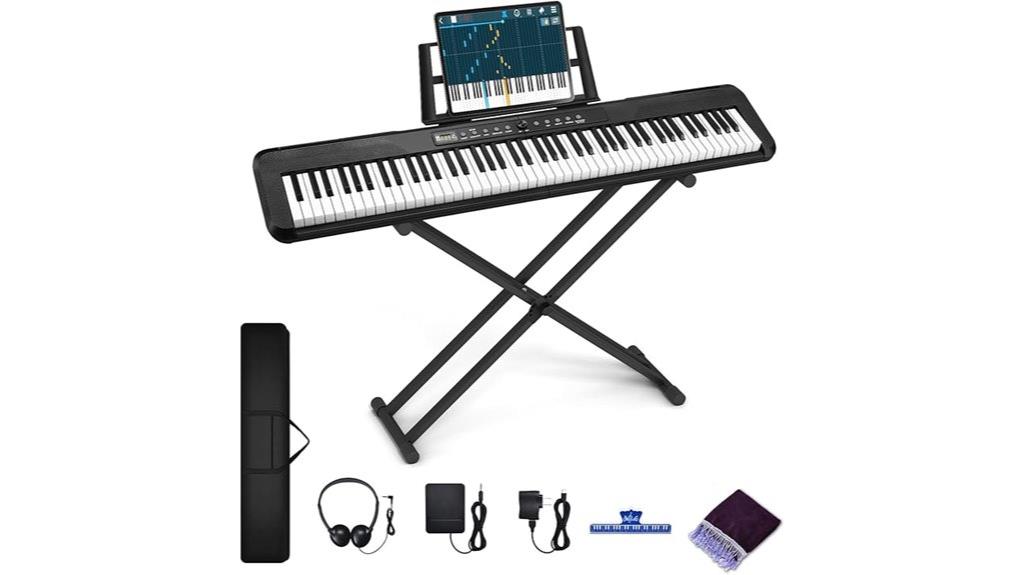
If you’re just starting out and want a versatile digital piano that adapts to your learning needs, this keyboard with Bluetooth, MIDI, and a stand is an excellent choice. It features 88 semi-weighted keys with velocity sensitivity, offering a realistic grand piano feel. With 200 rhythms, 80 demo songs, and dual keyboard functions, it suits practice and performance. The built-in speakers and external headphone jacks let you play anywhere, while Bluetooth and MIDI connectivity enable wireless practice and music creation. Complete with a stand, pedal, and music stand, it’s perfect for beginners and pros alike, making music accessible and fun at home or on stage.
Best For: Beginners and intermediate players seeking a versatile, portable digital piano with realistic touch and connectivity options for practice, performance, and learning.
Pros:
- Semi-weighted keys with velocity sensitivity provide a realistic grand piano feel.
- Multiple connectivity options including Bluetooth and MIDI support enhance creative and practice possibilities.
- Comes with essential accessories like a stand, pedal, music stand, and built-in speakers for immediate use.
Cons:
- Limited to 88 keys, which may not suit advanced players requiring more extensive ranges.
- The product availability date is set for August 27, 2025, indicating it may be a future release or a typo.
- No mention of built-in speakers power or specific sound customization features, which could be a limitation for some users.
KB-25mini USB MIDI Keyboard Controller with 25 Keys and Drum Pads
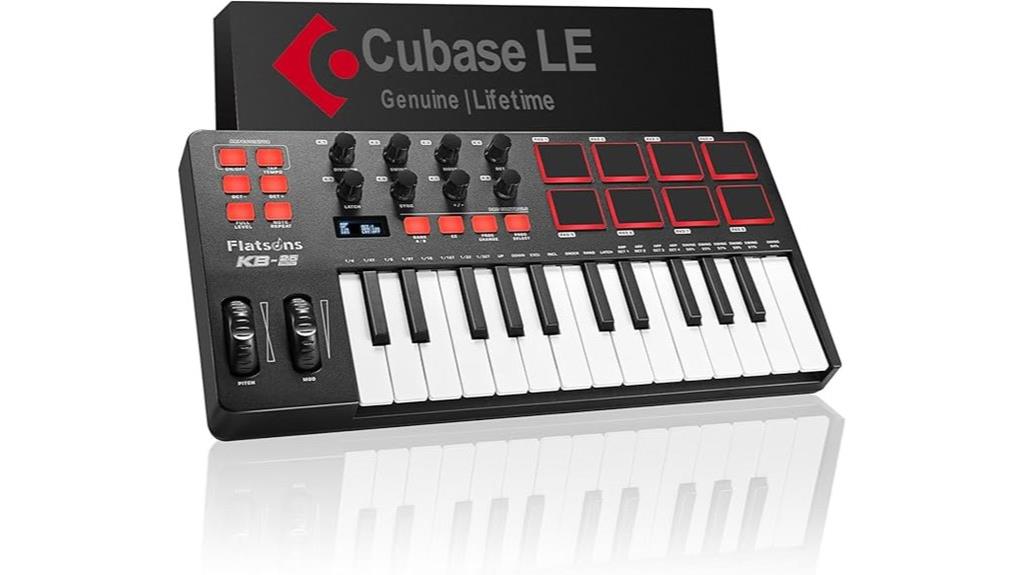
For beginners seeking an affordable and portable MIDI controller, the KB-25mini stands out with its 25 semi-weighted keys and intuitive drum pads. It features an arpeggiator, pitch and modulation wheels, and 8 customizable drum pads and knobs, giving you versatile control. The OLED display makes navigation easy, and its compact design ensures portability. Plus, it includes a free Cubase LE license valued at $99, perfect for recording and editing. Compatible with major DAWs and devices like tablets and smartphones, the KB-25mini offers excellent value, combining essential features with ease of use for those just starting their music journey.
Best For: beginners and amateur musicians seeking an affordable, portable MIDI controller with essential features for music production and performance.
Pros:
- Compact and lightweight design for easy portability and setup
- Includes a free Cubase LE license for recording and editing
- Features customizable knobs, drum pads, and an arpeggiator for versatile control
Cons:
- Limited to 25 keys, which may not suit advanced or complex compositions
- Reviews indicate some users experience durability issues over time
- Lacks advanced features found in higher-end controllers, such as aftertouch or full-sized keys
88 Key Digital Piano with Music Stand, Power Supply, Bluetooth, MIDI

The MIDI digital piano with a music stand, Bluetooth, and MIDI connectivity stands out as an excellent choice for beginners who want a versatile and user-friendly instrument. It features 88 semi-weighted keys that mimic grand piano touch, making practice and performance more realistic. The built-in speakers, headphone jacks, and portable battery-powered design allow for playing anytime, anywhere. With 200 rhythms, 200 polyphony, and support for Bluetooth MIDI, it’s great for learning, composing, and performing. Its smart teaching functions and wireless connectivity make it ideal for beginners and kids. Plus, it’s a thoughtful gift with positive reviews and high ratings, perfect for nurturing musical potential.
Best For: beginners, students, and casual musicians seeking a versatile, portable digital piano with realistic touch and connectivity options.
Pros:
- Semi-weighted keys provide a realistic grand piano feel suitable for practice and performance
- Bluetooth MIDI and wireless connectivity support easy integration with learning and creative apps
- Built-in speakers, headphone jacks, and portable battery power enable flexible playing anywhere
Cons:
- May lack advanced features found in professional-grade digital pianos
- Limited color options, primarily black, which might not match all decor styles
- The first available date is in June 2025, potentially delaying purchase and use
Vangoa 61-Key Portable Electric Keyboard with Stand, Pedal, Headphones
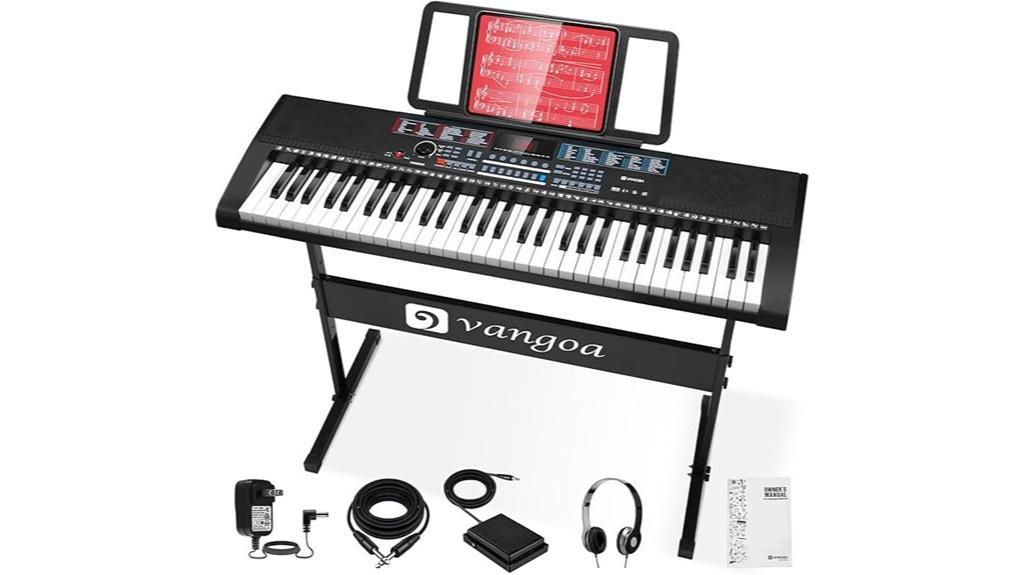
The Vangoa 61-Key Portable Electric Keyboard is an excellent choice for beginners who want a versatile and user-friendly instrument. Its full-size, velocity-sensitive keys deliver a realistic piano feel, making practice more engaging. The compact, lightweight design (around 15.9 pounds) and included stand make it easy to set up anywhere, whether at home or outdoors. With 500 sounds, rhythms, and demo songs, plus features like record/playback and split keys, it encourages creativity and learning. Connectivity options, including MIDI and audio inputs, expand its possibilities. The built-in speakers and headphone jack ensure versatile play, making it a well-rounded, beginner-friendly keyboard.
Best For: beginners of all ages seeking a portable, versatile, and user-friendly electronic keyboard for practice, learning, and creative musical exploration.
Pros:
- Full-size, velocity-sensitive keys provide an authentic piano feel.
- Wide variety of sounds, rhythms, and demo songs to inspire creativity.
- Portable design with multiple power options and included stand for easy setup anywhere.
Cons:
- As a beginner-focused instrument, it may lack advanced features for professional musicians.
- Built-in speakers might be insufficient for larger groups or performances.
- The absence of a dedicated display or touchscreen could limit real-time control and editing.
RockJam 61-Key Touch Display Digital Piano Kit with Bench, Stand, Headphones, Pedal & Piano Lessons
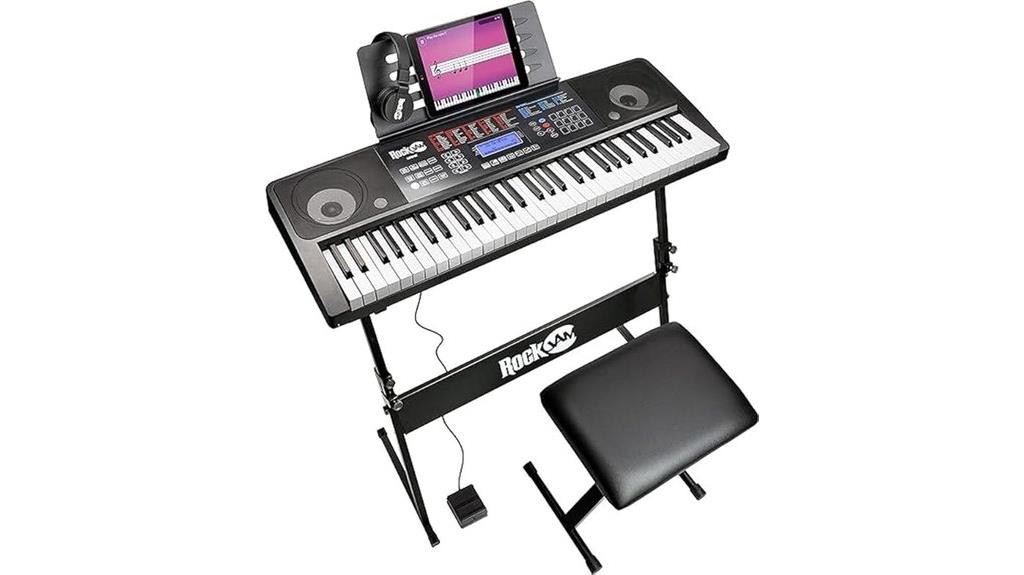
If you’re just starting out with piano, the RockJam 61-Key Touch Display Digital Piano Kit offers an all-in-one solution that combines essential features with portability. Its full-size keys deliver a traditional piano feel in a compact design, perfect for beginners. The touch screen provides instant feedback and access to 200 sounds, rhythms, and demo songs, making practice engaging. It includes recording, playback, and sound layering, plus MIDI output for connecting to DAWs like Ableton or Logic. With a foldable bench, adjustable stand, headphones, pedal, and lesson functions, this kit is a versatile and convenient choice to kickstart your musical journey.
Best For: Beginners, students, and amateur musicians seeking an all-in-one portable digital piano with learning features and versatile connectivity.
Pros:
- Full-size keys provide an authentic piano feel in a compact, portable design.
- Touch screen offers easy access to a wide variety of sounds, rhythms, and demo songs, enhancing practice engagement.
- Includes essential accessories like headphones, sustain pedal, adjustable stand, and a foldable bench, making it a comprehensive starter package.
Cons:
- Limited to 61 keys, which may not suffice for advanced pianists requiring a full 88-key keyboard.
- Some users might find the touch screen interface less tactile than traditional controls.
- The built-in sounds and features, while versatile, may be basic compared to high-end digital pianos with more advanced sampling and effects.
Arturia MiniLab 3 MIDI Controller for Music Production

For beginners seeking an intuitive and portable MIDI keyboard, the Arturia MiniLab 3 stands out with its sleek design and user-friendly features. It packs 25 velocity-sensitive keys, 8 RGB pads, 8 rotary encoders, and 4 sliders, all easily accessible in a compact, eco-friendly frame weighing just 2.2 pounds. The mini display and clickable browsing knob make navigation simple, while its USB-C connection supports Mac and Windows. Integrated with major DAWs and bundled with powerful software like Analog Lab V and Ableton Live Lite, it’s perfect for recording, performing, or jamming anywhere, helping you access your musical potential with ease.
Best For: beginners and portable music producers seeking an intuitive, compact MIDI controller with versatile features and bundled software.
Pros:
- Compact and lightweight design for portability and easy setup
- User-friendly interface with mini display and clickable browsing knob
- Integrates seamlessly with major DAWs and includes comprehensive software packages
Cons:
- Limited keys compared to larger MIDI controllers, which may restrict performance complexity
- May require additional equipment or software for advanced production workflows
- Eco-friendly materials could affect durability over long-term heavy usage
Yamaha 61-Key Portable Keyboard for Beginners
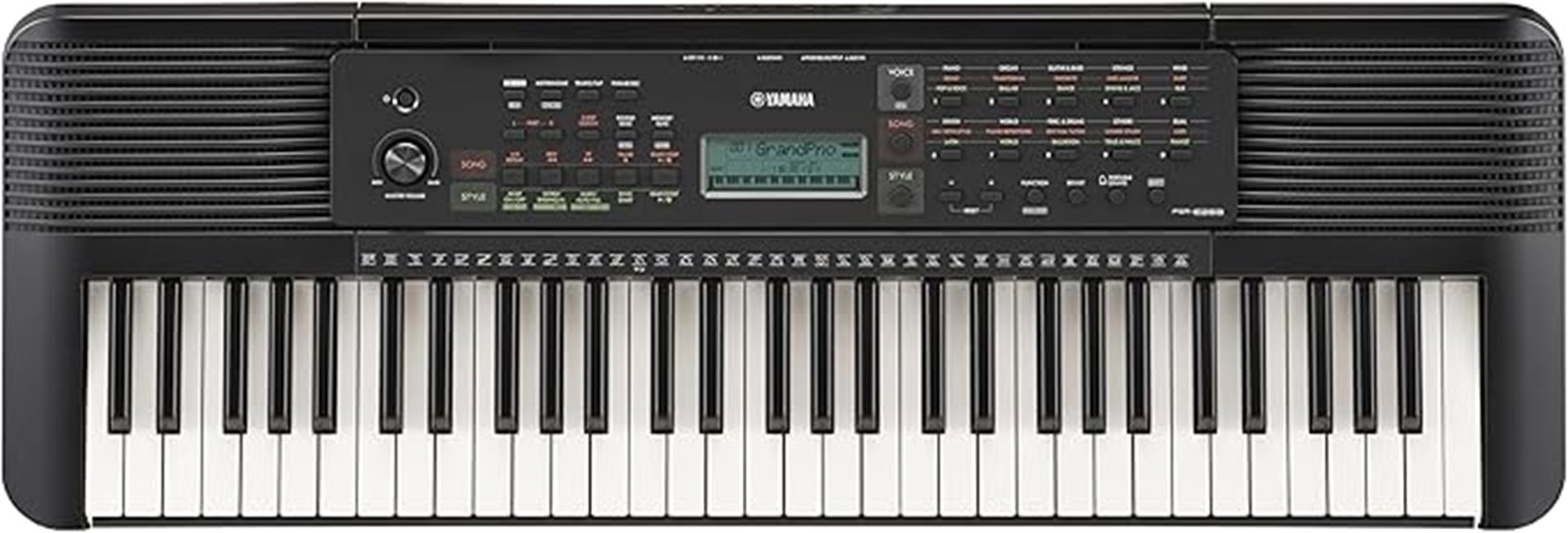
Ideal for beginners, the Yamaha PSR-E283 offers a user-friendly experience with full-sized keys and intuitive controls that make learning music accessible. It features a variety of sounds, including classic pianos and strings, along with a portable grand piano button for instant rich, expressive piano tones. Its built-in learning tools, like Quiz Mode and song recordings, support skill development, while Smart Chord simplifies playing complex chords with one finger. Weighing just 8.8 pounds, it’s portable and versatile, supporting both battery and corded power. Whether practicing at home or on the go, this keyboard provides an excellent foundation for new players ready to access their musical potential.
Best For: beginners of all ages seeking an easy-to-use, portable keyboard with built-in learning tools and versatile sound options.
Pros:
- User-friendly interface with full-sized keys ideal for beginners
- Built-in educational features like Quiz Mode and song recordings to enhance learning
- Portable design weighing only 8.8 pounds, suitable for practice anywhere
Cons:
- Limited advanced features for experienced players seeking professional-grade equipment
- Might require additional accessories or software for comprehensive learning
- Availability and pricing may vary across retailers and regions
Factors to Consider When Choosing MIDI Keyboards for Beginners
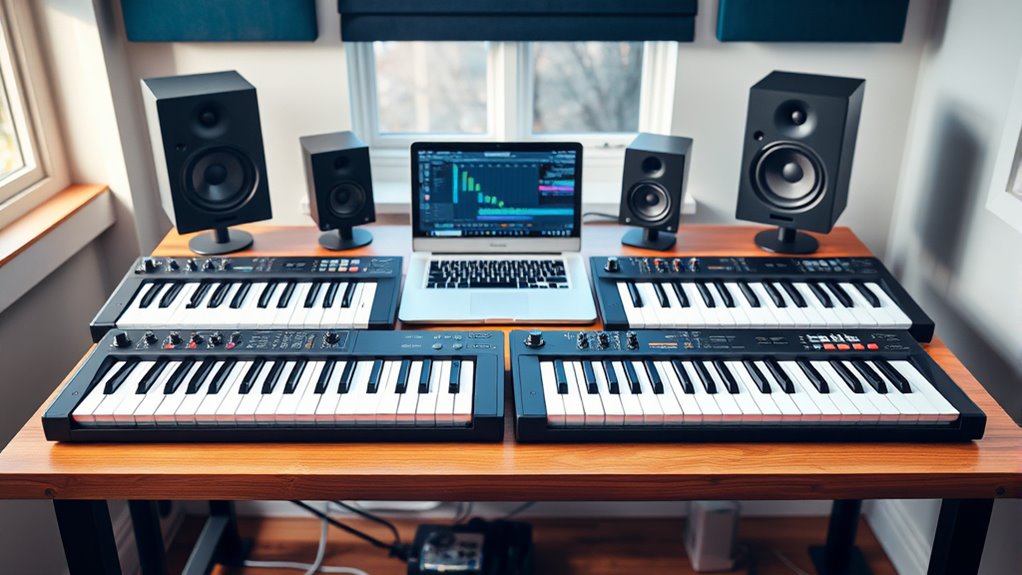
When choosing a MIDI keyboard, I look at key size and feel to make certain it matches my playing style. Connectivity options are also important so I can easily connect to my devices, while software compatibility ensures everything works smoothly. Finally, I consider portability and control features to find a setup that fits my space and creative needs.
Key Size and Feel
Choosing the right key size and feel is essential because it directly affects how comfortable and natural playing feels for beginners. Full-sized keys, around 23-25mm wide, mimic a real piano and make *progressing* to acoustic instruments smoother. Mini keys, about 15-20mm wide, save space but can require some adjustment during extended play. Semi-weighted keys strike a balance, offering expressive control without the heaviness of traditional piano keys, which helps beginners develop dynamics. Velocity sensitivity is also *paramount*—it allows you to control volume and expression based on how hard you press the keys. Ultimately, the feel of the keys impacts your ability to learn techniques and adapt to different instruments, making it an *indispensable* factor in choosing a MIDI keyboard that suits your comfort and musical goals.
Connectivity Options
Connectivity options are crucial for beginners because they determine how easily you can set up your MIDI keyboard with your devices. USB connectivity is especially important, as it allows for quick, plug-and-play connections with computers and tablets, making setup simple. Some keyboards also feature MIDI out ports, which are useful if you want to connect to external sound modules or older equipment. Wireless options like Bluetooth provide cord-free convenience, giving you more flexibility in your workspace. Additional ports such as 1/4-inch sustain pedal inputs and headphone jacks enhance your playing experience, offering more control and privacy during practice. Overall, versatile connectivity ensures compatibility with popular DAWs and educational apps, making your setup smoother and more adaptable as you progress in your musical journey.
Software Compatibility
Have you checked if the MIDI keyboard works smoothly with your preferred digital audio workstation (DAW) like Ableton Live, Logic Pro, or FL Studio? Compatibility is key to a seamless workflow. Confirm the keyboard supports your DAW’s software, especially if it comes with bundled virtual instrument libraries or software that integrate easily. Verify that it uses standard MIDI protocols and connects via USB or MIDI DIN, so you’re not limited in software options. Also, look for dedicated software editors or mapping tools that let you customize controls to fit your setup. Finally, consider whether the keyboard offers driverless plug-and-play functionality, which simplifies setup across different operating systems. This compatibility ensures you spend more time making music and less troubleshooting.
Portability and Size
When selecting a MIDI keyboard, considering its size and portability is essential, especially if you plan to move it frequently or work in different locations. Smaller models with 25 or 32 keys are ideal for portability, making them easy to carry and perfect for on-the-go music creation. Larger controllers, like 61, 76, or 88 keys, tend to be bulkier and heavier, which can be cumbersome if you need to transport them often. Compact designs are usually lightweight, reducing fatigue during long sessions. Most portable MIDI controllers connect via USB and don’t require external power, simplifying setup and enhancing mobility. Ultimately, the size should match your available space and your goals—balancing ease of transport with the functionality you need.
Control Features
Choosing a MIDI keyboard with the right control features can substantially enhance your music-making experience. Look for keyboards with assignable knobs, faders, or buttons, which let you control virtual instruments and effects directly. Modulation and pitch bend wheels or strips are essential for expressive performances, giving your sound more life and dynamics. Built-in arpeggiators, chord modes, or performance features add creative options without needing extra software, making it easier to experiment. Consider the number and type of controls, such as drum pads or transport controls, to match your production or live playing needs. Finally, ensure these features are easily accessible and can be customized through software mapping, so you can tailor the interface to your workflow and make the most of your creative potential.
Price and Budget
Budget is a key factor when selecting a MIDI keyboard for beginners, as prices can range from around $50 to $300. Setting a clear budget helps narrow your options and guarantees you get the best value for your money. Cheaper models often have fewer keys and basic controls, which are still enough for learning and basic music production. On the other hand, higher-priced options usually include extra features like more keys, drum pads, and software, but these might be unnecessary for someone just starting out. Investing a little more can also mean better durability and longer-lasting quality, supporting your growth as you improve. Ultimately, balancing your needs and budget will guide you to a MIDI keyboard that fits your goals without overspending.
Build Quality
A MIDI keyboard’s build quality plays a vital role in ensuring it can withstand daily use and last through your learning journey. I look for sturdy construction with high-quality materials that promise durability and longevity, especially as I practice regularly. A compact, lightweight design is also important, making it easy to transport without compromising its structural integrity. Well-made knobs, pads, and keys should provide reliable tactile feedback and precise control, enhancing my playing experience. Robust connections and jacks are essential to prevent damage from frequent plugging and unplugging during practice sessions. Good manufacturing standards mean fewer mechanical failures over time, ensuring consistent performance. Prioritizing build quality helps me invest in a MIDI keyboard that’s both reliable and capable of supporting my musical growth.
Frequently Asked Questions
How Do I Connect MIDI Keyboards to My Computer or Tablet?
To connect a MIDI keyboard to your computer or tablet, I first use a USB cable or MIDI interface, depending on the keyboard’s ports. I plug the USB directly into my device or connect via the interface for older models. Once connected, I open my digital audio workstation (DAW) or music app, and it usually recognizes the keyboard automatically. Sometimes, I need to install drivers or update software for smooth operation.
What Is the Difference Between Semi-Weighted and Synth-Action Keys?
Semi-weighted keys have a balance between weighted and synth-action keys, offering a more realistic feel similar to acoustic pianos. Synth-action keys are lighter and more responsive, making them ideal for fast playing and electronic music. I prefer synth-action for its agility, especially when I’m practicing or performing quickly. Semi-weighted keys feel more natural for piano-like playing, so it really depends on your style and what you want to achieve.
Are Built-In Sounds Necessary for Beginner MIDI Keyboards?
Built-in sounds aren’t necessary for beginner MIDI keyboards, but they can be helpful. I find that they offer immediate fun and inspiration without needing extra gear. However, I prefer keyboards without them because I like to explore sounds through my software and plugins. Ultimately, it depends on your goals—if you want quick access to sounds, built-in options are great; if you want more control, go without.
Can I Use These Keyboards for Live Performances?
Yes, you can use these keyboards for live performances. Many beginner MIDI keyboards are lightweight and portable, making them easy to carry on stage. While they might lack built-in sounds, you can connect them to a computer or sound module to trigger your preferred sounds live. Just make certain your setup is reliable, and you’re good to go. I’ve found that with some practice, they work great for live gigs.
How Important Are Additional Features Like Drum Pads and Bluetooth Connectivity?
Ever wonder if those extra features really make a difference? I believe they do! Drum pads let me add beats on the fly, making my music more dynamic. Bluetooth connectivity is a game-changer, allowing me to jam wirelessly with apps or speakers. These features boost creativity and convenience, especially for beginners. While not essential, they definitely enhance your experience and can inspire new ideas.
Conclusion
Choosing the right MIDI keyboard is like finding the right key to unlock your musical potential. Whether you’re just starting out or looking to grow, these options can help you make beautiful music. Remember, a journey of a thousand miles begins with a single step. So, pick the one that feels right for you, and let your creativity flow. Your musical future is waiting—don’t be afraid to take that first step!

